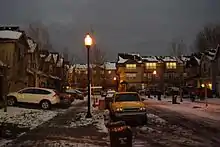Witch Hazel, Oregon
Witch Hazel is a neighborhood of the city of Hillsboro in Washington County, Oregon, United States. Formerly an unincorporated community, and considered a separate populated place by the United States Geological Survey,[1] it is on the Tualatin Valley Highway and the Southern Pacific railroad line a mile (1.6 km) west of Reedville.[2]
Witch Hazel, Oregon | |
|---|---|
Neighborhood | |
 New Witch Hazel Elementary School | |
| Country | United States |
| State | Oregon |
| Region | Washington County |
| Time zone | UTC-8 (PST) |
| • Summer (DST) | UTC-7 (PDT) |
| Postal code | 97123 |
| Part of: | Hillsboro |
History

A small cemetery for the Stewart family dating to 1856 was discovered in Witch Hazel when the land was cleared for development.[3] According to An Illustrated History of the State of Oregon by H. K. Hines, the Stewarts lived on "Hazelwitch farm" beginning in 1849.[4] Former Portland mayor Van B. DeLashmutt had a farm there in the 1880s and supposedly named the place for one of his racehorses, however.[2][5] But according to racehorse authority Governor Oswald West, he had never heard of a racehorse named "Witch Hazel".[2] Mayor DeLashmutt did once own a building at Southwest Front and Madison streets in Portland that he called the "Witch Hazel Building".[2] Apparently he liked the name, although the witch-hazel plant, Hamamelis virginiana, is not native to Oregon.[2]
The Portland, Eugene and Eastern Railway had a station at Witch Hazel with the line later becoming part of the Southern Pacific.[6]
DeLashmutt once had the finest string of racehorses in the Pacific Northwest and his racetrack at Witch Hazel was once one of the best racetracks in America.[5] There were two tracks on his Witch Hazel Farm. The main track was a 1 mile (1.6 km) oval used for races. The second, a half-mile (0.80 km) oval was surrounded by sheds.[7]
Witch Hazel post office was established in 1904 and closed in 1905.[2] About 1921, 400 acres (1.6 km2) in Witch Hazel were subdivided for a development called Witch Hazel Little Farms.[8][9] The property was divided into 24 tracts of up to 10 acres (40,000 m2), and by November 1921 ten tracts had been sold.[9][10] By May 1922, the number of tracts had increased to 27, and 24 had been sold.[10] By August 1924, however, the developer was reporting that eight tracts had been sold in the preceding week, and 75 acres (300,000 m2) remained unsold.[8] At that time water, gas, and electricity were all available in the development and construction on three homes had begun.[8] In 1927, dog racing began at a track in Witch Hazel featuring whippets.[11]
In 1999 and 2002, Metro brought 318 acres (1.29 km2) in Witch Hazel into the urban growth boundary.[12] The City of Hillsboro passed a community development plan for the area in February 2004.[12] Once the development is completed, it is estimated that it will house 5,000 people.[13]
Schools
In 1859, a school was built in neighboring Reedville and children from the Witch Hazel area attended school at that one-room schoolhouse.[14] The Witch Hazel School District 79 was formed in 1889 and took its 28 students out of the Reedville School District.[14][15] The one-school Witch Hazel district merged back into the Reedville district in 1966.[14]
The current Witch Hazel Elementary School is located in the community on Davis Street at Brookwood Avenue, and is part of the Hillsboro School District.[16] A new building was built in 2003 to replace the old structure located on Tualatin Valley Highway at Brookwood Avenue prior to the re-alignment of Brookwood Avenue and Witch Hazel Road at the highway.[12] The reconstruction of those intersections came in late 2006.[17] In 2009, South Meadows Middle School opened adjacent to the elementary school.[18]
References
- "Witch Hazel". Geographic Names Information System. United States Geological Survey. 1980-11-28. Retrieved 2009-12-20.
- McArthur, Lewis A.; Lewis L. McArthur (2003) [1928]. Oregon Geographic Names (7th ed.). Portland, Oregon: Oregon Historical Society Press. p. 1054. ISBN 0-87595-277-1.
- "Stewart Family Cemetery". Hillsboro Historical Society. Retrieved 2009-12-20.
- Hines, H. K. (1893). "An Illustrated History of the State of Oregon". Chicago: Lewis Pub. Co. pp. 454–455.
- Writers' Program of the Work Projects Administration in the State of Oregon (1940). Oregon: End of the Trail. American Guide Series. Portland, Oregon: Binfords & Mort. pp. 480–481. OCLC 4874569.
- Benson, Robert L. (October 19, 1976). "Historic Potpourri: Historian lists railroad stations, stops, sidings". Hillsboro Argus. p. 18.
- "Van B. De Lashmutt Passes in Spokane". The Oregonian. October 5, 1921. p. 13.
- "Sales quota is passed". The Oregonian. August 31, 1924. p. 18.
- "Witch Hazel Tracts Sold". The Oregonian. November 6, 1921. pp. 3: 10.
- "Little Farms Find Buyers". The Oregonian. May 21, 1922. pp. 4:10.
- "Entry list for dog show closes soon". The Oregonian. March 13, 1927. p. 7: 2.
- "Witch Hazel Village Community Development". City of Hillsboro. Archived from the original on 16 January 2010. Retrieved 15 January 2010.
- "Witch Hazel Village Community Plan" (PDF). City of Hillsboro. February 2004. Retrieved 15 January 2010.
- Jensen, Doris (October 17, 1976). "Communities: Reedville named for early resident". Hillsboro Argus. p. 17.
- Benson, Robert L. (October 19, 1976). "Historic Potpourri: Courthouse fire destroys school records in '20s". Hillsboro Argus. p. 10.
- "Witch Hazel Elementary School". Hillsboro School District. Retrieved 2009-12-20.
- "Brookwood - Witch Hazel at TV Highway". David Evans and Associates, Inc. January 8, 2007. Retrieved 15 January 2010.
- Christensen, Nick (September 8, 2009). "School transitions mark second decade of Century 21". The Hillsboro Argus. Retrieved 20 December 2009.
External links
- Description of DeLashmutt farm from the April 5, 1893 Beaverton Chronicle